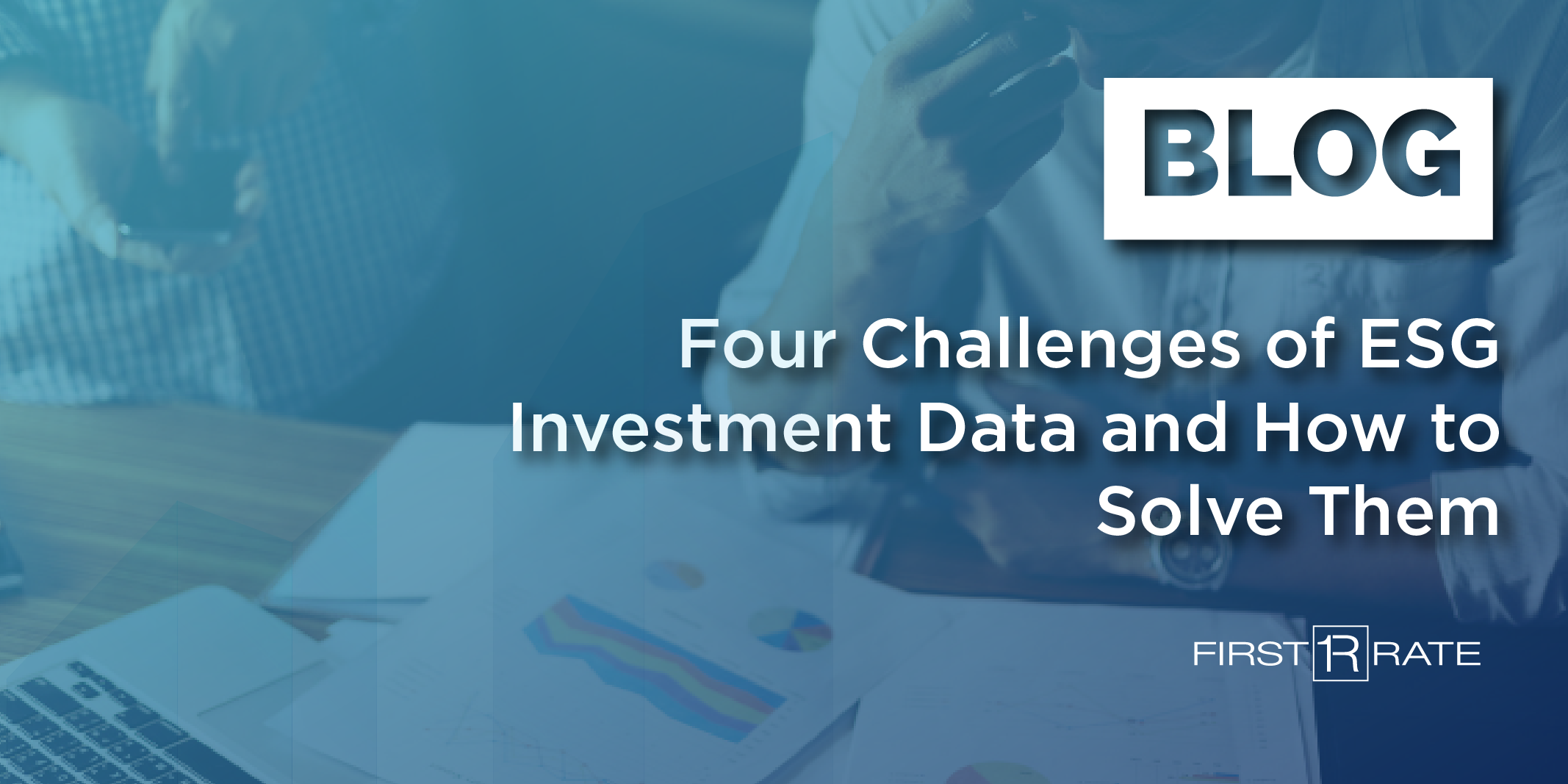Four Challenges of ESG Investment Data and How to Solve Them

Environmental, social, and governance (ESG) investing is rapidly gaining in popularity. Clients are diversifying their portfolios and investing in responsible businesses, while wealth managers want to recommend strong ESG funds with proven returns. One issue that wealth managers and clients face is a lack of consistent, reliable data on ESG investments.
We convened a panel of ESG subject-matter experts to discuss some of the drivers and challenges behind ESG investment data. We’ve combined our findings with insights into how wealth managers can overcome these limitations.
Difficulties Comparing Independent ESG Data Across Multiple Funds
Typically, wealth managers do not have easy access to high-quality, objective, independent ESG fund and performance information. While they do get snippets of ESG data, these perspectives tend to be tied to specific funds, and are predominantly offered by the fund provider. Providers are naturally interested in promoting their own products, so an independent, high-level, side-by-side comparison across multiple funds can be challenging.
Although wealth management firms have comprehensive portfolio and investment analysis tools, they tend to rely on hard trends, metrics, valuations, and allocations. These tools are not nuanced enough to take into account ESG considerations like environmental or social impact or the strength of corporate governance.
Few wealth managers have the time or resources to research multiple ESG stocks and funds themselves, meaning they are not as empowered to have conversations with clients.
Lack of Standards ESG Data Reporting and Collection
There is not a single, commonly defined set of ESG targets, standards, or thresholds. Even if wealth managers get access to independent ESG data, there’s no consistency in how that information is reported.
For example, one corporation may report on environmental impact in terms of the amount of CO2 that defined, specific activities produce—while another may report an end-to-end amount. Without the appropriate context, it’s difficult to tie corporate activities back to their ESG credentials.
Some corporations are self-reporting their progress, rather than being independently audited by an external, independent company, while others use ESG rating agencies—but again, the criteria and measures chosen can vary widely.
Businesses self-report on how responsible they are at environmental practices. Then there are third-party UN agencies or other NGOs that will rate companies based on their carbon production and produce rankings and analysis. There are some ESG data providers who will take third-party ratings, NGO findings, and self-reported information, merge them together, and where the third party doesn’t match the self-reported, they will discount the self-reported information and provide a more objective analysis.
The Sheer Quantity of ESG Data Creates a Low Signal-to-Noise Ratio
Every deeper analysis is resulting in a deluge of market, fund, and stock information. Combine that with the multiple ways to report on ESG, and it’s easy for wealth managers to become completely overwhelmed. The challenge here is to pull the most relevant points from a vast amount of information and interpret it in a way that helps to inform client investment decisions.
The data that wealth managers pull out must speak to the purpose, personal values, and goals of an investor.
An Ever-Changing ESG Environment Makes it Hard to Offer Practical, Timely Advice
Ideas around ESG investing—and data to support or disprove those ideas—is constantly changing. This even comes down to returns on investment for ESG funds, with multiple studies showing that ESG funds underperform, overperform, and match the overall market. Because there are so many different factors, it’s challenging to provide consistent, well-sourced, timely advice. As a result, wealth managers end up not having the conversation with their clients at all.
When it comes to ESG, there’s often a wide gap between intent, wealth, interest in sustainable investing, and actual allocations into those funds. Providing wealth managers with informed, independent, timely ESG information means they can suggest funds with confidence, and close the gap.
How to Access and Compare Independent, Verified, Reliable ESG Data
We want to help wealth managers have better ESG conversations with investors so that their clients can make more informed decisions. Given the problems with data gathering, self-reporting, signal-to-noise ratios, and a fast-changing environment, we know it’s vital that wealth managers have consistent, accurate, and timely information.
That’s why we’ve partnered with Purpose Capital Advisors to provide deep insight into sustainable ESG investment opportunities. As a result of our partnership, we’re proud to offer “Blue Chip Sustainable Fund Rankings” to surface easy-to-understand, relevant ESG information.
Our partnership approach to sharing ESG information is to:
- Create a fund universe focused on a variety of funds with a strong emphasis on robust ESG and sustainable investing.
- Derive a funds list from domestically domiciled mutual funds and ETFs, combined with sustainable portfolio construction strategies.
- Provide information on sustainable funds that’s understandable to an average investor looking for cost-effective strategies with track records that support the notion of long-term buy and hold positions.
- Help build globally diversified, sustainable, impact investing portfolios.
At present, the universe consists of approximately 1,175 funds, segmented into 20 peer groups (e.g. large-cap domestic stocks, municipal bonds, emerging market stocks, etc.) These groups are filtered against two criteria to make it onto the Blue Chip Sustainable Funds list:
- Is the fund cost-effective?
- How do fund fees stack up against its peer group?
If the fund is too expensive relative to its peers, it will be excluded from the list.
Strong ESG Analytics Leads to Returns in Line with Investor Values
ESG investors will have their own standards of success, and while much of that will likely be tied to high returns, they also want to invest in line with their values. For example, an investor may be seeking a high-dividend generating portfolio with minimal environmental impact. The analysis provided by the Blue Chip Sustainable Fund Rankings enables wealth managers to offer that combination of requirements.
Our hope is that wealth managers can use this information to recommend existing, high-performing ESG funds as part of the advice they offer clients, or even develop their own ESG strategies. As clients start to invest in line with their values, fund managers can advise on, and offer, a range of impact investing funds without compromising returns or responsibilities.







